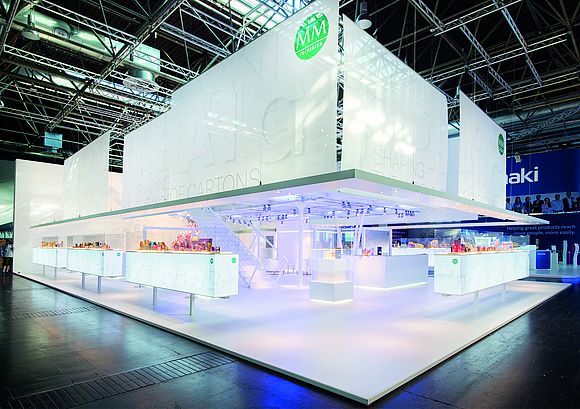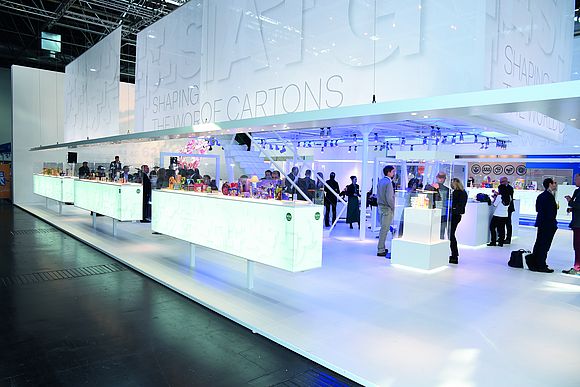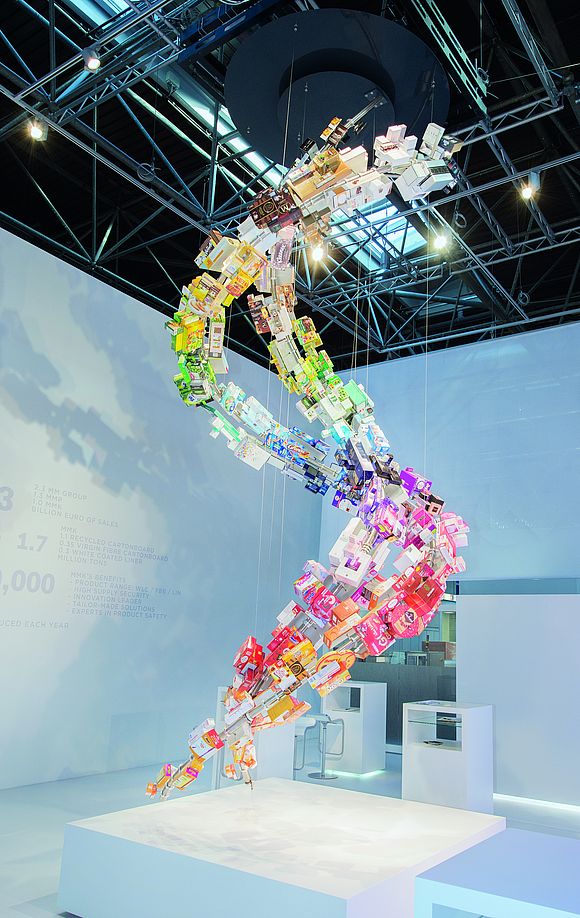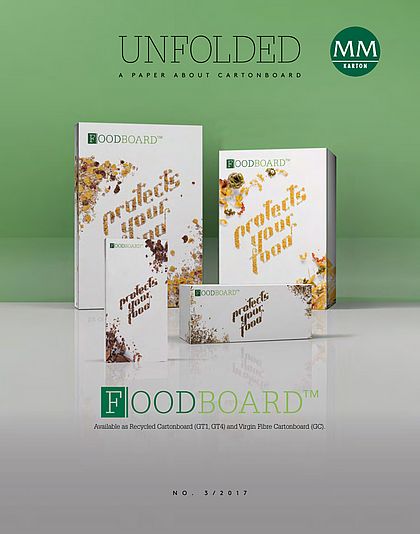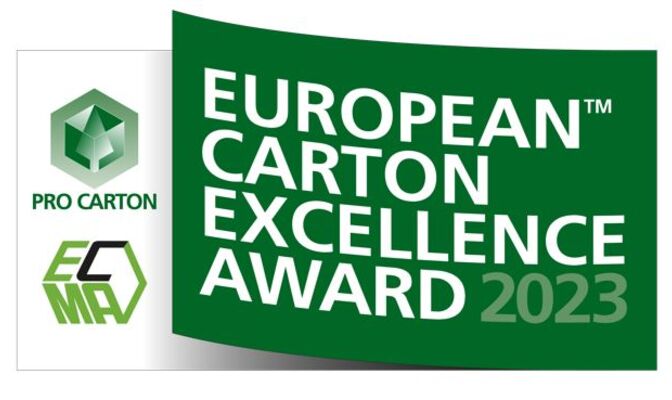MMK on location – The most important industry events in Q2/Q3 2017
22.08.2017 - Fairs
In 2017, the Interpack once again impressively cemented its claim of being the most important event and innovation platform for the packaging industry every three years. For MM Karton as well, it was the highlight of the year.
InterPack
May 4 to 10, 2017, Düsseldorf
The Interpack is one of the absolute “must-attend” events for companies in the packaging industry and is known to be a key trendsetter. It is the place where providers and customers from all over the world come together to exchange ideas and start collaborations. As in the past, the 2017 Interpack filled Düsseldorf’s trade fair venue to capacity: About 2,900 exhibitors presented 170,000 visitors from around 170 countries with important industry and environment information, and showed a multitude of innovative products and processes. Among the key trends at the fair were digitalisation of production processes on the road to Industry 4.0 applications on the one hand, and sustainability on the other. ”Save Food” remained the main topic at the show and formed its focus, as it had in 2011 and 2014.
The MM both could justly be called an “eye catcher”, as the booth design “literally” revolved around our core business, cartonboard packaging. Cleverly presented as a rotating DNA installation, it attracted a great deal of attention. Our presentations on the topic of food safety, which informed visitors about legal fundamentals and regulatory changes regarding food packaging, and our new arrival in the barrier product portfolio, FOODBOARD™ virgin fibre, were also met with keen interest.
Once again, the Interpack has proven its worldwide leadership role in the packaging industry. MM Karton was able to demonstrate how intelligent packaging solutions can make an important contribution to mastering the social challenges along the entire supply chain.
Fresenius-Conference:
Residues of Mineral Oil and Synthetic Hydrocarbons in Food
March 28 to 29, 2017, Düsseldorf
The sources of mineral oil hydrocarbons are many (e.g. raw materials, production processes, environment, transport, packaging) and present great challenges to analysis and quality management. During the international Fresenius Conference in Düsseldorf at the end of March, representatives of the food and packaging industries (Nestlé, Bundesverband der Deutschen Süßwarenindustrie, (Federal Association of the German Sweets Industry)), politics (Bundesinstitut für Risikobewertung (Federal Institute for Risk Assessment), Sächsisches Ministerium für Verbraucherschutz (Saxony Ministry of Consumer Protection)), and science (Cantonal Laboratory Zurich, TU Dresden, ADM Research) came together to discuss current insights from monitoring and research. They also exchanged practical experiences with analytics and toxicology, and talked about problem solving strategies.
In the fourth draft of the mineral oil regulations by the German Bundesministerium für Ernährung und Landwirtschaft or BMEL (Federal Ministry of Food and Agriculture), which was published in February 2017, the authority exclusively targets mineral oil aromatic hydrocarbons (MOAH) and their transfer from food utility items to the food itself.
The maximum permissible migration value into the food has been redefined – until further notice – at 0.5 mg/kg MOAH (C16 to C35). The “distributor” of the food contact material (= packaging) must guarantee that this specific migration value is not exceeded.
Dr. Sieglinde Stähle, scientific head of the German Bund für Lebensmittelrecht und Lebensmittelkunde or BLL, (German Association for Food Law and Food Science) was of the opinion that the topic of migration must finally be underpinned by a solid legal basis by providing the necessary toxicological foundation. Koni Grob, Cantonal Laboratory Zurich, criticized that the concentration on MOAH alone is insufficient. Other unintended substances must also be taken into account. Ultimately, Prof. Dr. Thomas Simat, TU Dresden, confirmed that cross contamination is a source of migration. Research has shown that even foods packaged in virgin fibre cartonboard are showing MOAH values caused by cross-contamination.
NIAS and Mineral Oils in Food
March 29 to 30, 2017, Munich
The aim of the Munich conference was to give an overview of the hot topic of migration of unintended substances (NIAS, Non-Intentionally Added Substances) and mineral oils, and to promote exchange about the issues of unintended substances within the food packaging chain.
Both the VTT Technical Research Centre of Finland, which conducted a comprehensive migration study commissioned by Scandinavian cartonboard producers, and Udine University, who also examined the effects and parameters of migration through cartonboard for the company Barilla, confirm cross-contamination from transport packaging as a source of migration. Eddo Hoekstra, Directorate General Joint Research Centre, Food Contact Materials Group, JRC, made it clear that the EU intends to pursue this topic strongly and issue appropriate regulation.
Global Food Contact 2017
May 15 to 17, 2017, Rome
Over 180 participants came to Rome in mid-May to discuss important updates regarding global legislation on food contact materials, food safety, and appropriate traceability along the entire supply chain. The conference gave a good overview of the worldwide legal situation – from Canada via Latin America all the way to Japan. Particularly the talks by Lionel Spack, Manager for Packaging Chemical Safety of Nestlé, and Eugenio Cavallini, Technical Manager of CEPI (Confederation of European Paper Industries), were received with keen interest.
Lionel Spack explained that food producers are faced with ever increasing national requirements. In light of progressing globalisation, this presents difficult challenges.
The Nestlé company, for example, has taken the initiative to establish a risk assessment process for different foods and has inferred the optimum packaging parameters for Nestlé.
Eugenio Cavallini focused in detail on the current situation in Europe and the lack of clear EU-wide legislation. The increasing international attention to the issue of mineral oil migration is intensifying the political pressure to create clear regulations at the European level to legally define the issue.
MM Karton’s experience and solutions regarding food safety were in high demand and were received with great interest by the professional audience. Our innovative FOODBOARD™ – recycled as well as virgin fibre – with its barrier properties protects foods from mineral oil and other unintended substances, so our customers across the world are well equipped to handle the challenges of the future.
AFCO Congress 2017
May 24 to 27, 2017, Gijón
Around 200 representatives and suppliers of the corrugated board industry came together at this year’s congress of the AFCO, the Spanish Association of Corrugated Board Producers. MM Karton was present with its compelling liner product palette and drew particular attention with its new development MM BIB Liner™, the tailor-made quality for the growing bag-in-box market. With its innovative fibre structure, MM BIB Liner™ has outstanding BCT values (box compression test) – highest processing performance and attention on the store shelf are guaranteed.
RosUpack 2017
June 20 to 23, 2017, Moscow
With over 500 companies from 33 countries, the annual Ros-Upack is the largest packaging trade fair in Russia, the GUS and Eastern Europe. A number of significant converters as well as pulp, paper, and cartonboard producers present new production techniques and innovative technology and trends in four exhibit halls. A large variety of innovative products for packaging solutions was introduced.
In particular our most recently developed qualities, the new virgin fibre Kraft quality Excellent Top™ Kraft with top surface and brown Kraft reverse side, as well as UD Braun with brown top and reverse sides attracted a great deal of interest among visitors. In addition, the MMK liner qualities were the topic of many intense conversations; not least because MM Karton is also the leading supplier of white coated recycled liner qualities in the Russian market.
Visit us soon at the following events:
FEFCO Technical Seminar | October 11 to 13, 2017, Vienna

